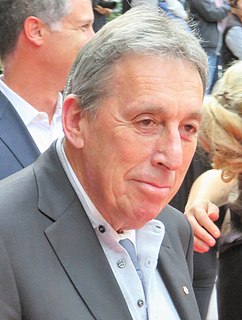A Quote by Robert Picardo
Sometimes I have little movies that I've made that I wish would be seen by a larger audience. I have a horror movie called 'Sensored' which I'm very creepy and disgusting in, and then I have a family drama called 'The Legends of Nethiah' which has a science-fiction B-story.
Related Quotes
You have to decide what kind of story you're going to tell. For instance I would argue a movie like 'Toy Story 3,' which isn't realistic at all, is really emotional and involving. It just depends. I played this game called 'Superbrothers: Sword & Sworcery EP' for iPad that is totally old school 8-bit, which I found very moving.
Experimental novels are sometimes terribly clever and very seldom read. But the story that appeals to the child sitting on your knee is the one that satisfies the curiosity we all have about what happened then, and then, and then. This is the final restriction put on the technique of telling a story. A basic thing called story is built into the human condition. It's what we are; it's something to which we react.
The literature now is so opaque to the average person that you couldn't take a science-fiction short story that's published now and turn it into a movie. There'd be way too much ground work you'd have to lay. It's OK to have detail and density, but if you rely on being a lifelong science-fiction fan to understand what the story is about, then it's not going to translate to a broader audience.
The desire for story is very, very deep in human beings. We are the only creature in the world that does this; we are the only creature that tells stories, and sometimes those are true stories and sometimes those are made up stories. Then there are the larger stories, the grand narratives that we live in, which are things like nation and family and clan and so on. Those stories are considered to be treated reverentially. They need to be part of the way in which we conduct the discourse of our lives and to prevent people from doing something very damaging to human nature.
Somebody pointed out to me that there's no horror film on my resume, which is true, but I also don't really go see those movies. Although when I was thinking about it, I was thinking "I would probably have a really nice beach house if I made a horror movie." They seem to be very popular. I just don't think it's my thing.
I can think of very few science books I've read that I've called useful. What they've been is wonderful. They've actually made me feel that the world around me is a much fuller, much more wonderful, much more awesome place than I ever realized it was. That has been, for me, the wonder of science. That's why science fiction retains its compelling fascination for people. That's why the move of science fiction into biology is so intriguing. I think that science has got a wonderful story to tell.




































